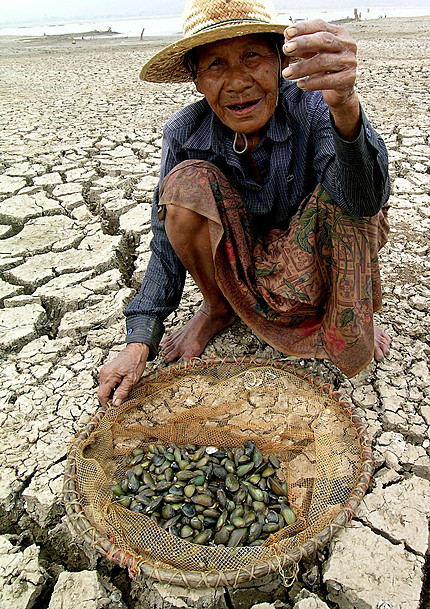 It's pretty clear that more and more people are realizing the crisis in the global food supply that is coming down the pipe compliments of global warming.
It's pretty clear that more and more people are realizing the crisis in the global food supply that is coming down the pipe compliments of global warming.Here, Lester Brown lays out how the upcoming Copenhagen climate change treaty negotiations will impact global food security for decades to come (for better or for worse):
It is the disappearing glaciers in the Himalayas and on the Tibetan Plateau that are of most concern, because their ice melt sustains the flow of the major rivers of India and China—the Indus, Ganges, Yangtze, and Yellow rivers—during the dry season. This ice melt thus also sustains the irrigation systems that depend on these rivers.
Yao Tandong, one of China’s leading glaciologists, who predicts that two thirds of China’s glaciers could be gone by 2050, says “the full-scale glacier shrinkage in the plateau region will eventually lead to an ecological catastrophe.”
It will also lead to a humanitarian catastrophe. China is the world’s leading producer of wheat. India is number two. (The United States is third.) In contrast to the United States, most wheat grown in China and India is irrigated. With rice, these two countries totally dominate the world harvest. The projected melting of these mountain glaciers in Asia represents the most massive threat to food security the world has ever seen.
The prospects for the harvests of wheat and rice, in these two countries, each with over a billion people, are of concern everywhere. We live in an integrated world food economy, one where harvest shortfalls anywhere can drive up food prices everywhere.
It's not just the melting of glaciers that are the source of Asia's agricultural and drinking water that we have to be worried about. It's also the impacts of rising temperatures:
Rising temperature also directly affects crop yields. In a study published by the U.S. National Academy of Sciences, an international team of scientists confirmed the rule of thumb emerging among crop ecologists that for each 1 degree Celsius rise in temperature above the norm during the growing season, we can expect a 10 percent decline in wheat and rice yields. In a world with limited grain stocks—a world that is only one poor harvest away from chaos in grain markets—a crop-shrinking heat wave in a major grain-producing region could lead to politically destabilizing food shortages.
Does anybody still have any doubt that our transition to a Green Economy powered by clean energy technologies (not to mention transition to a more sustainable food supply and other land uses) is crucial for maintaining our economy, health, security and quality of life?
Food security is right up there at the top of Maslow's hierarchy of needs, so hopefully this line of messaging helps us gain some traction on solutions...
Read more>
...
Consider the Connection to:
ReplyDeleteDenial(-) Vs. Climate (+) ACTION
SEE NO CLIMATE
HEAR NO CLIMATE
SPEAK NO CLIMATE
(-)___R___(+) ACTION
The choice is ours.
Our economy, health, & planet R N D
balance!!!
Google R AIM Search 4 me:
CTC123GREEN
great article
ReplyDelete